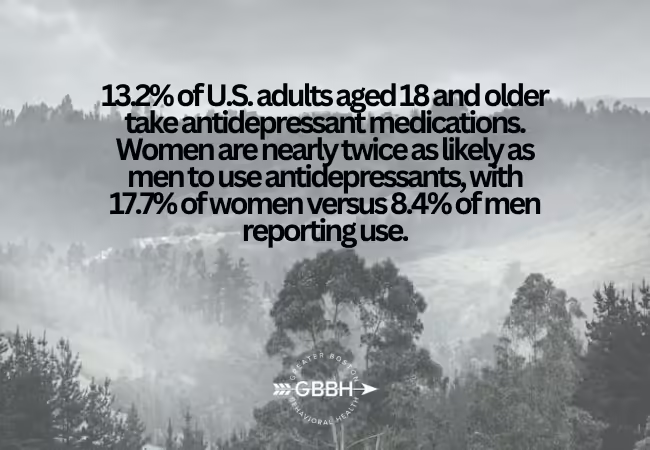Antidepressants have revolutionized mental health care, offering relief for millions of people suffering from conditions like depression, anxiety, and mood disorders. These medications can play a critical role in stabilizing symptoms, improving quality of life, and facilitating deeper engagement in therapeutic programs. However, as with any treatment, antidepressants have both advantages and limitations. Understanding these is essential for making informed decisions about mental health care.
At Greater Boston Behavioral Health, we provide a holistic approach to mental health, combining evidence-based therapies, comprehensive Mental Health Programs, and medication management. This blog explores the pros and cons of antidepressants, their role in comprehensive treatment plans, and how they can be effectively integrated with therapies like Depression Treatment Programs, Anxiety Treatment Programs, and Trauma Therapy Programs.
What Are Antidepressants?
Antidepressants are medications designed to regulate brain chemistry, specifically neurotransmitters like serotonin, dopamine, and norepinephrine, to alleviate symptoms of mental health conditions. They are commonly prescribed as part of a broader treatment plan that includes Mental Therapy Programs, Group Therapy Programs, and sometimes more intensive care options like Partial Hospitalization Programs (PHP) or Intensive Outpatient Programs (IOP).
Types of Antidepressants
- Selective Serotonin Reuptake Inhibitors (SSRIs): Medications like fluoxetine (Prozac) and sertraline (Zoloft), widely used due to their efficacy and lower side effect profile.
- Serotonin-Norepinephrine Reuptake Inhibitors (SNRIs): Examples include venlafaxine (Effexor) and duloxetine (Cymbalta), often prescribed for depression and anxiety.
- Tricyclic Antidepressants (TCAs): An older class of antidepressants that are effective but associated with more side effects.
- Monoamine Oxidase Inhibitors (MAOIs): Effective but less commonly prescribed due to dietary restrictions and potential interactions.
- Atypical Antidepressants: Medications like bupropion (Wellbutrin), which work differently from other classes and often have fewer sexual side effects.
The Pros of Antidepressants
1. Effective Symptom Management
Antidepressants can alleviate a wide range of symptoms, including persistent sadness, fatigue, and anxiety. This symptom relief often enables individuals to engage more fully in therapy and daily life.
2. Addressing Co-Occurring Conditions
Many antidepressants are effective for multiple mental health challenges, including:
- Generalized Anxiety Disorder (GAD).
- Panic Disorder.
- Post-Traumatic Stress Disorder (PTSD), often addressed in Trauma Therapy Programs.
- Obsessive-Compulsive Disorder (OCD).
This versatility makes them a valuable component of comprehensive care plans like Mental Health Programs.
3. Enhancing Therapy Outcomes
For individuals enrolled in therapy programs such as Cognitive Behavioral Therapy (CBT) or Family Therapy Programs, antidepressants can stabilize mood and improve focus, making therapy more effective.
4. Crisis Stabilization
In cases of severe depression or suicidal ideation, antidepressants can provide critical stabilization, particularly when combined with intensive care options like PHP or IOP.
5. Long-Term Improvement
With consistent use and proper monitoring, antidepressants can lead to sustained improvements in mood and overall mental health.
The Cons of Antidepressants
1. Potential Side Effects
Side effects can vary based on the individual and the specific medication. Common side effects include:
- Nausea or gastrointestinal discomfort.
- Weight gain or appetite changes.
- Sexual dysfunction.
- Insomnia or fatigue.
Close monitoring and open communication with healthcare providers are essential to managing these effects.
2. Delayed Onset of Effectiveness
Unlike painkillers or other medications, antidepressants often take 2–6 weeks to show noticeable results. This delay can be frustrating for individuals seeking immediate relief.
3. Risk of Withdrawal Symptoms
Abruptly stopping antidepressants can lead to withdrawal symptoms, including dizziness, mood swings, and flu-like symptoms. Proper tapering under medical supervision is critical.
4. Not Effective for Everyone
Research suggests that 30–40% of individuals may not experience significant symptom relief from antidepressants alone. For these individuals, combining medication with programs like Anger Management Programs or Group Therapy Programs can enhance outcomes.
5. Stigma
Despite growing awareness, some individuals still face societal stigma for using medication, which can discourage adherence to treatment plans.
How Antidepressants Fit into a Comprehensive Mental Health Program
Antidepressants are most effective when integrated into a holistic treatment plan that addresses the full scope of mental health challenges. At Greater Boston Behavioral Health, we emphasize combining medication with therapy, structured programs, and lifestyle adjustments.
1. Pairing Antidepressants with Therapy
Therapeutic approaches such as CBT and Dialectical Behavior Therapy (DBT) are highly effective when combined with medication. These therapies help individuals:
- Reframe negative thought patterns.
- Develop coping skills for emotional regulation.
- Address root causes of mental health challenges.
2. Incorporating Medication into Structured Programs
In programs like PHP or IOP, antidepressants are carefully managed as part of a comprehensive treatment plan. These programs provide:
- Regular check-ins with psychiatrists and therapists.
- Consistent monitoring of symptoms and medication effects.
- A supportive environment for recovery.
3. Addressing Underlying Issues
While antidepressants target symptoms, therapy addresses underlying causes. Programs like Trauma Therapy Programs and Family Therapy Programs focus on healing past wounds and improving relational dynamics.
4. Encouraging Peer and Family Support
Incorporating loved ones into the recovery process through Family Therapy Programs fosters understanding and collaboration. Similarly, Group Therapy Programs provide opportunities to share experiences and build a supportive community.
5. Monitoring and Adjusting Treatment Plans
Regular evaluations ensure that medications remain effective and side effects are minimized. Adjustments to dosage or therapy approaches may be necessary as recovery progresses.
Making an Informed Decision
Deciding whether to use antidepressants is a personal choice that should involve consultation with a healthcare provider. Consider the following steps:
- Educate Yourself: Understand the potential benefits and risks of different antidepressant options.
- Seek Professional Guidance: A psychiatrist or therapist can help determine whether medication is the right choice.
- Combine with Therapy: Medication is most effective when paired with therapeutic interventions like those offered in Mental Health Programs.
- Commit to Monitoring: Regular check-ins with your provider ensure that your treatment plan remains effective and well-suited to your needs.
Why Choose Greater Boston Behavioral Health?
At Greater Boston Behavioral Health, we are committed to providing personalized, evidence-based care that addresses the unique needs of each individual. Our comprehensive approach combines medication management with therapy and structured programs for holistic healing.
What We Offer:
- Specialized programs, including Depression Treatment Programs, Anxiety Treatment Programs, and Trauma Therapy Programs.
- Levels of care ranging from PHP and IOP to outpatient therapy.
- A team of experienced therapists and psychiatrists dedicated to your well-being.
- Holistic therapies to support overall mental health and resilience.
Conclusion
Antidepressants can be a powerful tool in mental health recovery, but they are most effective when integrated into a comprehensive treatment plan. At Greater Boston Behavioral Health, we are here to guide you through every step of your journey.
Contact us today to learn more about our services, including Mental Health Programs, Group Therapy Programs, and holistic care options. Together, we can create a path to lasting wellness and hope. Call us today at (888)278-0716 to learn more about our programs and start your journey toward emotional well-being.
FAQ on The Pros and Cons of Antidepressants
What conditions do antidepressants treat?
Antidepressants are commonly prescribed for depression, anxiety disorders, PTSD, OCD, and certain mood disorders. They are often part of comprehensive treatment plans, including Mental Health Programs and therapy.
What are the benefits of antidepressants?
Antidepressants can stabilize mood, reduce anxiety, improve sleep, and enhance overall functioning, especially when combined with therapy and structured programs like PHP or IOP.
What are the potential side effects of antidepressants?
Side effects may include nausea, weight changes, fatigue, insomnia, or sexual dysfunction. These effects vary by individual and medication type.
Are antidepressants effective for everyone?
While many benefit from antidepressants, they may not work for everyone. Combining medication with therapies like CBT, DBT, or Trauma Therapy Programs often improves outcomes.
How do antidepressants fit into a treatment plan?
Antidepressants are most effective when integrated into a broader treatment plan, including therapy, structured programs, and lifestyle changes, to address both symptoms and underlying causes.
Is it safe to stop antidepressants abruptly?
No. Stopping antidepressants suddenly can cause withdrawal symptoms. Always consult your healthcare provider to taper off medications safely.


